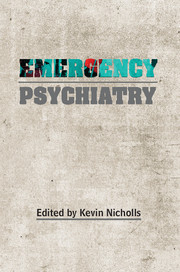Book contents
- Frontmatter
- Contents
- List of contributors
- Acknowledgements
- Preface
- 1 Assessment of suicide risk
- 2 Violence and aggression
- 3 Substance misuse emergencies
- 4 Alcohol and psychiatric emergencies
- 5 Acute psychosis
- 6 Acute side-effects of psychotropic medication
- 7 Emergencies in child and adolescent psychiatry
- 8 The psychiatric intensive care unit
- 9 Safeguarding
- 10 Emergency electroconvulsive therapy
- 11 Life-threatening medical emergencies in a mental health unit
- 12 Emergencies in intellectual disability psychiatry
- 13 Emergencies in older persons’ psychiatry
- 14 Perinatal psychiatric emergencies
- 15 Civilian and military psychological trauma
- 16 Emergencies in liaison psychiatry
- 17 Psychiatric emergencies in deaf people
- 18 Mental health law
- 19 Self-poisoning: aspects of assessment and initial care
- Index
14 - Perinatal psychiatric emergencies
Published online by Cambridge University Press: 01 January 2018
- Frontmatter
- Contents
- List of contributors
- Acknowledgements
- Preface
- 1 Assessment of suicide risk
- 2 Violence and aggression
- 3 Substance misuse emergencies
- 4 Alcohol and psychiatric emergencies
- 5 Acute psychosis
- 6 Acute side-effects of psychotropic medication
- 7 Emergencies in child and adolescent psychiatry
- 8 The psychiatric intensive care unit
- 9 Safeguarding
- 10 Emergency electroconvulsive therapy
- 11 Life-threatening medical emergencies in a mental health unit
- 12 Emergencies in intellectual disability psychiatry
- 13 Emergencies in older persons’ psychiatry
- 14 Perinatal psychiatric emergencies
- 15 Civilian and military psychological trauma
- 16 Emergencies in liaison psychiatry
- 17 Psychiatric emergencies in deaf people
- 18 Mental health law
- 19 Self-poisoning: aspects of assessment and initial care
- Index
Summary
The conception rate in most women suffering from a mental disorder is the same as in the general population. Only those suffering from moderate to severe intellectual disability, anorexia nervosa or psychosis have lower rates. However, despite the lower conception rate in women with psychosis, estimates of the number of such women who are mothers range from 56 to 63% (McGrath et al, 1999; Howard et al, 2002). Women with affective disorders are more likely to be multiparous (Jablensky et al, 2005). Therefore, mental health professionals working with women of childbearing potential are likely to have to deal with a psychiatric emergency involving a pregnant or postpartum woman at some point, and many of the women they treat have the potential to become pregnant. This chapter will address the treatment of such patients.
Pregnancy
More than a third of pregnant women suffer from a mental disorder (Kelly et al, 2001). Some will be experiencing pre-existing disorders, whereas others will experience a new onset. Pregnancy is a mulitfactorial stressor and might contribute to women with a past history of mental disorder experiencing a recurrence, particularly if medication has been discontinued.
It has previously been thought that pregnancy is protective against relapse; for example, that women with bipolar disorder are less likely to experience an episode of illness during pregnancy (Sharma & Persad 1995; Grof et al, 2000). However, a third to half of all bipolar women experience worsened symptoms during pregnancy (Blehar et al, 1998; Freeman et al, 2002). In the latter study, those who had symptoms in pregnancy were more likely to have a postpartum episode and their episodes were almost exclusively depressive. Akdeniz et al (2003) observed that 32% of bipolar women had episodes during pregnancy or postpartum. Viguera & Cohen (1998) identified that episodes during pregnancy are more likely to be depressive or dysphoric mixed states than in manic states. Half of these occurred in the first trimester.
Pregnancy should be considered as a possibility in any woman who presents as a psychiatric emergency, as 50% of pregnancies in the UK are unplanned. A woman who is very unwell might not tell you or even be aware that she is pregnant. The youngest mother in the UK was 11 years old when she delivered and the oldest was in her 60s, so this is not just an issue for psychiatrists treating women of working age.
- Type
- Chapter
- Information
- Emergency Psychiatry , pp. 240 - 248Publisher: Royal College of PsychiatristsPrint publication year: 2015



